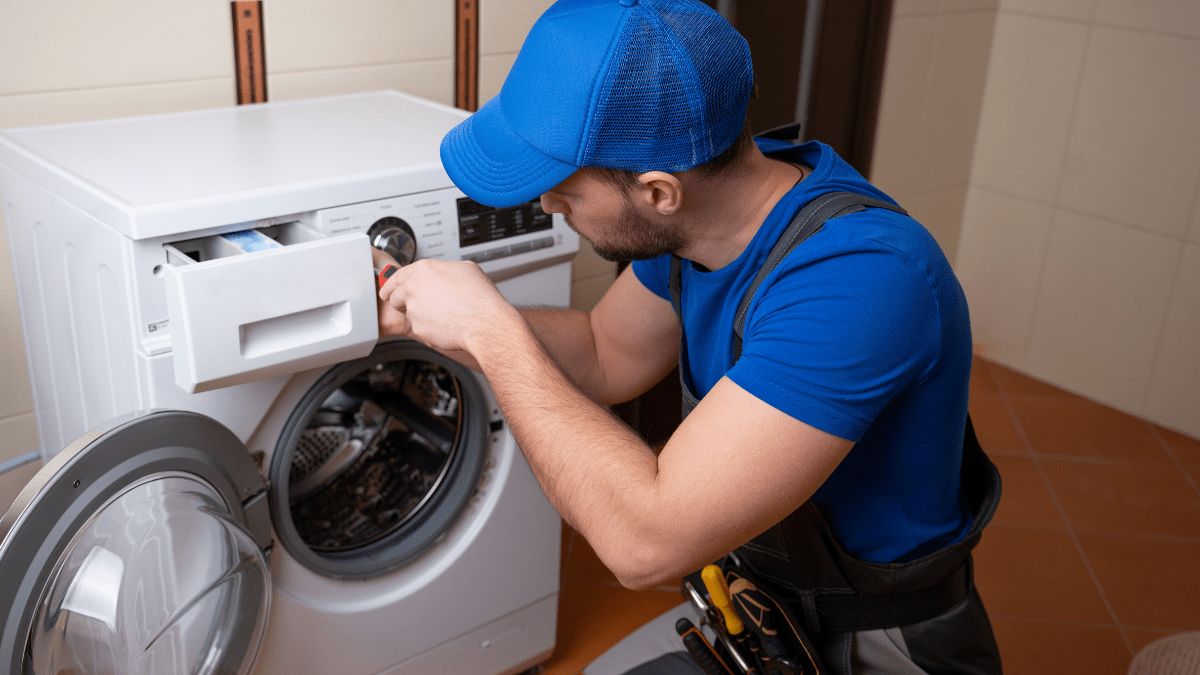Essential Washing Machine Repair Tips for Common Problems
Washing Machine Repair Tips, Washing Machine Troubleshooting: Washing machines play a crucial role in our daily lives, making laundry chores more manageable. However, when they encounter problems, it can lead to inconvenience and frustration. This comprehensive guide provides essential washing machine repair tips to help you tackle common issues such as leaks, noises, and drainage problems. From troubleshooting and practical DIY fixes to maintenance strategies, these tips will assist you in keeping your washing machine running efficiently and effectively. Whether you're dealing with a machine that won’t start or a slow drain, this guide offers valuable solutions to restore your appliance’s performance.
Washing machines are essential appliances in modern homes, handling our laundry needs efficiently. However, like any complex machine, they can encounter issues that disrupt their performance. Understanding how to diagnose and repair common problems can save you time, money, and stress. This guide provides essential washing machine repair tips, offering practical solutions to keep your appliance in top condition.
1. Washing Machine Won’t Start
Why It’s Important: A washing machine that doesn’t start can leave you with a pile of dirty laundry and an inconvenient situation.
Possible Causes and Solutions:
- Check the Power Supply:
- Ensure the machine is plugged in: Verify that the power cord is securely connected to the outlet.
- Test the outlet: Plug in another device to confirm the outlet is working.
- Inspect the Door or Lid Switch:
- Test the switch: If the door or lid switch is faulty, the machine won’t start. Test the switch with a multimeter and replace it if necessary.
- Examine the Circuit Breaker:
- Check for tripped breaker: Ensure the circuit breaker hasn’t tripped. Reset it if needed.
2. Washing Machine Doesn’t Spin
Why It’s Important: A washing machine that doesn’t spin leaves your clothes soaked and can indicate underlying issues with the appliance.
Possible Causes and Solutions:
- Check the Load Balance:
- Redistribute clothes: Unevenly distributed clothes can prevent spinning. Rearrange the load to balance it evenly.
- Inspect the Drive Belt:
- Look for wear and tear: The drive belt helps the drum spin. Check for damage or wear and replace it if necessary.
- Examine the Lid Switch:
- Test the switch: A faulty lid switch can prevent spinning. Test and replace the switch if needed.
3. Washing Machine Leaks Water
Why It’s Important: Water leaks can cause damage to your flooring and increase your water bills. Identifying and fixing leaks is crucial to prevent further issues.
Possible Causes and Solutions:
- Inspect the Hoses:
- Check for damage: Examine the inlet and drain hoses for cracks or leaks. Replace any damaged hoses.
- Ensure proper connections: Make sure hoses are securely connected and not loose.
- Examine the Door Seal:
- Look for tears or debris: A damaged or dirty door seal can cause leaks. Clean or replace the seal as necessary.
- Check the Drain Pump:
- Inspect for clogs or damage: A clogged or damaged drain pump can lead to leaks. Clean or replace the pump if needed.
4. Washing Machine Makes Loud Noises
Why It’s Important: Loud noises during operation can indicate internal problems and may affect the machine’s performance.
Possible Causes and Solutions:
- Inspect the Drum Bearings:
- Listen for grinding noises: Worn drum bearings can cause grinding noises. Replace the bearings if they’re worn out.
- Check for Foreign Objects:
- Examine the drum: Small objects like coins or buttons can cause noise. Remove any foreign objects from the drum.
- Examine the Drive Belt:
- Look for damage: A worn or damaged drive belt can create noise. Replace the belt if needed.
5. Washing Machine Stops Mid-Cycle
Why It’s Important: When a washing machine stops mid-cycle, it can leave your laundry in an incomplete state and cause inconvenience.
Possible Causes and Solutions:
- Inspect the Water Supply:
- Check for water flow: Ensure there is adequate water supply to the machine. Check valves and hoses for blockages.
- Examine the Control Board:
- Look for malfunction: A faulty control board can cause the machine to stop mid-cycle. Consult a professional if you suspect control board issues.
- Test the Door Lock:
- Check the locking mechanism: A malfunctioning door lock can interrupt the cycle. Test and replace the door lock if necessary.
6. Washing Machine Smells Bad
Why It’s Important: A bad smell coming from the washing machine can indicate mold, mildew, or buildup, affecting both the appliance and your laundry.
Possible Causes and Solutions:
- Clean the Drum:
- Use a cleaning solution: Run a cleaning cycle with a washing machine cleaner or a mixture of vinegar and baking soda.
- Inspect the Door Seal:
- Clean and dry the seal: Wipe down the door seal to remove moisture and prevent mold growth.
- Check the Drain Pump Filter:
- Clean the filter: A clogged drain pump filter can contribute to unpleasant odors. Clean the filter regularly.
7. Washing Machine Displays Error Codes
Why It’s Important: Error codes can provide valuable information about the nature of the problem, helping you diagnose and fix issues more efficiently.
Possible Causes and Solutions:
- Refer to the Manual:
- Consult the user manual: Look up the error code in the washing machine’s manual to understand its meaning.
- Reset the Machine:
- Power cycle the machine: Turn off the washing machine, unplug it for a few minutes, then plug it back in and restart it.
- Contact Customer Support:
- Seek professional help: If the error persists, contact customer support or a professional technician for assistance.
8. Washing Machine Doesn’t Drain
Why It’s Important: A washing machine that doesn’t drain properly can leave water in the drum and affect your laundry.
Possible Causes and Solutions:
- Inspect the Drain Hose:
- Check for clogs: Ensure the drain hose is not clogged or kinked. Clear any obstructions.
- Examine the Drain Pump:
- Check for blockages: A clogged or malfunctioning drain pump can prevent proper drainage. Clean or replace the pump if needed.
- Check the Water Level Switch:
- Test the switch: A faulty water level switch can affect drainage. Test and replace the switch if necessary.
9. Washing Machine Vibrates Excessively
Why It’s Important: Excessive vibration can damage the washing machine and surrounding areas, and it indicates potential issues with the appliance’s stability.
Possible Causes and Solutions:
- Level the Machine:
- Adjust the feet: Ensure the washing machine is level and adjust the feet if necessary.
- Inspect the Shock Absorbers:
- Check for wear: Worn or damaged shock absorbers can cause excessive vibration. Replace them if needed.
- Balance the Load:
- Redistribute clothes: An unbalanced load can lead to excessive vibration. Rearrange the clothes to balance the load.
10. Washing Machine Drains Slowly
Why It’s Important: Slow drainage can indicate blockages or issues with the drainage system, affecting the washing machine’s performance.
Possible Causes and Solutions:
- Check the Drain Hose:
- Clear any clogs: Ensure the drain hose is not blocked or kinked. Clean the hose if needed.
- Inspect the Drain Pump Filter:
- Clean the filter: A clogged drain pump filter can slow drainage. Clean the filter regularly.
- Examine the Drain Pump:
- Check for obstructions: Ensure the drain pump is free of debris and functioning properly.
Conclusion
Addressing common washing machine problems with these essential repair tips can help maintain the efficiency and longevity of your appliance. Regular maintenance, timely repairs, and understanding how to troubleshoot issues are key to keeping your washing machine running smoothly. If you encounter complex issues beyond basic repairs, consider seeking professional assistance to ensure proper handling and avoid further damage.

